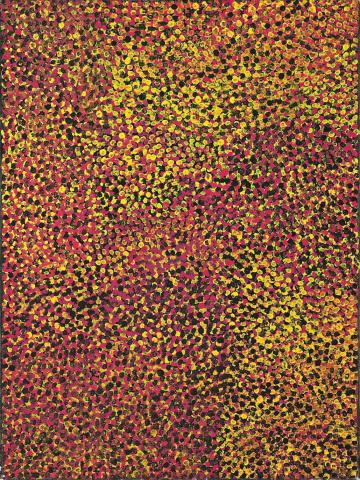UNTITLED, 1991
EMILY KAME KNGWARREYE
synthetic polymer paint on canvas
122.0 x 91.0 cm
bears inscription verso: artist name, Delmore Gallery cat. 91.J02, commissioned by Delmore
Commissioned by Delmore Gallery, via Alice Springs in 1991
Gallery Gondwana, Alice Springs
Private collection, Canberra, acquired from the above in 1991
This work is accompanied by a certificate of authenticity from Delmore Gallery, Alice Springs
The genius of Emily Kame Kngwarreye is evident in the way she created highly evocative paintings of great visual complexity out of deceptively simple marks with the brush. This bold and striking early painting by Kngwarreye conveys the drama and fertility of the desert landscape toward the end of the winter dry season. Painted in October of 1991, it is one of a series of paintings undertaken at the time that celebrate the life-giving forces of nature, and the corresponding metaphorical equivalents in spiritual and human terms – recurring themes throughout the artist's body of work.
Significantly, Untitled, 1991 was created at a time when Kngwarreye’s painting was itself undergoing a process of transformation, with the artist abandoning the background tracery of the underlying yam roots and emu tracks, a consistent compositional device in her earlier paintings, and transitioning instead into fields of pure dots. This was also a time when Kngwarreye experimented with colour and broadened her palette beyond traditional colours and their derivatives, to incorporate brighter hues such as blue, green, and in this case, vivid reds and yellows. Kngwarreye suggests not only a sense of delight in the colours of the landscape; rather, now colour itself becomes both the impetus for – and subject of – such paintings.
The powerful colours in this work are taken from the life cycle of the berry called Oorooterna. The berry's fruits range in colour from pale cream in its infancy through a spectrum of yellows into oranges and finally into a red/orange. This progression is determined by the stage of ripeness and decay of the fruit.
Emily Kame Kngwarreye painted a number of canvases in this style, including Kame Flowers of 1991 in the Holt collection, Northern Territory1 and Fruit of the Vine, 1990, in the Behan collection, Canberra.2 These paintings glow with a sense of exuberant celebration of the ancestral forces that permeate the earth.
1. See Isaacs, J., Kame flowers, 1991 in Emily Kngwarreye Paintings, Craftsman House, Sydney, 1998, p. 66, pl. 18 (illus.)
2. See Neale, M. et al., Emily Kame Kngwarreye. Utopia: The genius of Emily Kame Kngwarreye, The National Museum of Art, Osaka, 2008, p. 130, pl. D-17 (illus.)
CRISPIN GUTTERIDGE
